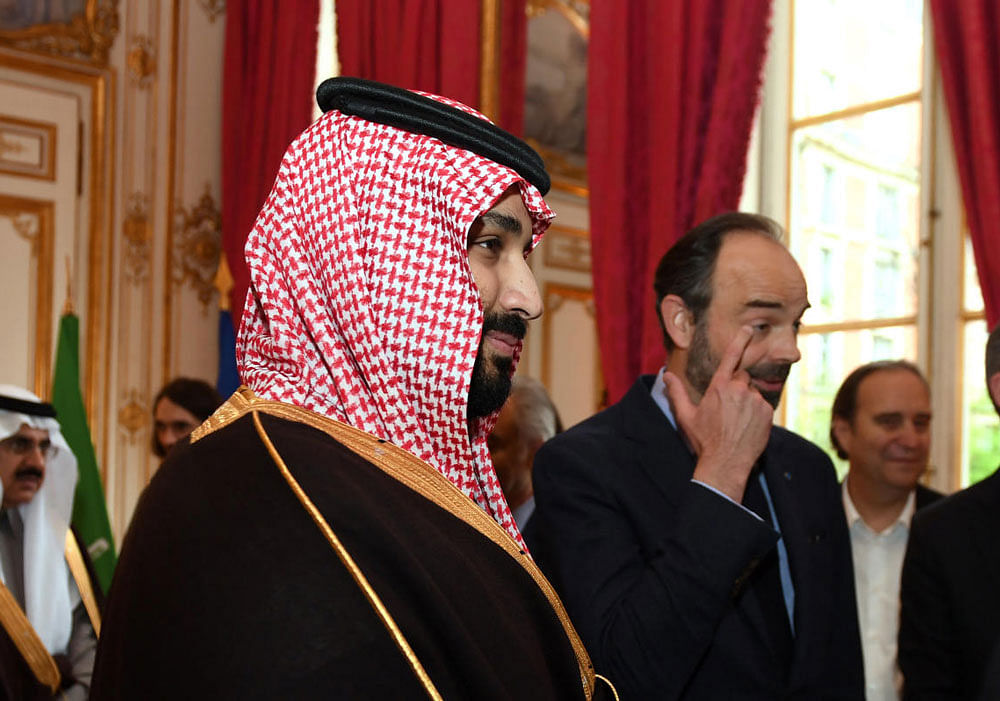
Saudi King Salman bin Abdulaziz Al Saud is 82 years old, ailing and incapacitated from a stroke and advancing effects of Alzheimer’s. That has led to a practical secession of the kingdom’s control levers into the hands of the 32-year-old heir-apparent, Crown Prince Mohammad bin Salman bin Abdulaziz Al Saud or MBS.
With a brutally determined and successful track record of eliminating any potential pitfalls to his formal accession to the throne, MBS is believed to have gone as far as ordering his mother Fahda bin Falah bin Sultan bin Hathleen to stay away from the King, as she is supposed to have objected to his brazen power grab.
Later, MBS launched a crippling purge and a quasi-coup against more than 40 other fellow princelings and senior governmental officials in Saudi Arabia’s own ‘Night of the Long Knives’ — ostensibly a drive against corruption and money laundering — thereby defanging any potential rival and establishing his larger constituency with the restive youth of Saudi Arabia, who typically take a dim view of the traditional elite networks and the Al Saud family clique.
Having usurped the power buttons and with age firmly on his side, the Crown Prince is poised to rule and define the future narrative of the most influential Islamic country (the Saudi King is also called the ‘Custodian of the Two Holy Mosques’).
Opinions across the world are deeply divided on the contours, form and real intent behind the MBS-led changes, which are moving fast, making a lot of noise and, supposedly, ushering in an era of “moderation” and reforms within the governing laws and interpretations of Islam, as a fundamental course-correction. While he has launched the much-overdue social reforms in allowing women to drive, limiting the “guardianship” system and restraining the Mutaween (religious police), there are no democratic reforms or let up in the state-outlook against sectarianism.
Besides iron-fencing his own position, MBS is on an overdrive to checkmate the growing influence of Iran and to reshape the Saudi economy beyond its dependence on oil - Vision 2030. This chosen journey has led him to succinctly define the “triangle of evil” that threatens to derail his roadmap. His “triangle” firstly entails Iran, the Shiite powerhouse of the region, secondly the Muslim Brotherhood (“they want to use the democratic system to rule the country!”), and, lastly, the Al-Qaida/Islamic State (IS), which are bitterly opposed to the Al Saud family rule. Essentially, each of these three “evils” threatens the prevailing regime in Riyadh of the descendants of Ibn Saud. To safeguard against them, MBS has deployed convenient half-truths.
The pathological hatred of Iran has made MBS blame the 1979 Iranian Revolution for the extremism in Saudi Arabian society by claiming, “We were living a very normal life like the rest of the Gulf countries. Women were driving cars, there were movie theatres in Saudi Arabia, women worked everywhere. We were normal people, developing like any other country in the world, until the events of 1979”, and further advancing the theory of ‘extremist Shiite ideology’.
While the portrayal of pre-1979 Saudi society is factually incorrect, the latter accusation is a convenient interpretation, especially since the fountainhead of the current terror organisations like the IS, Taliban or Boko Haram owes its existence to Saudi Arabian beneficence and ideological support. The reality is that there have been no major terror attacks in recent times that can be traced back to Iran, and the women in the Iranian context have been way ahead of any other Islamic nation on most socio-economic parameters. Example: 70% of all science and engineering pass-outs in Iran are women.
The half-truths in MBS’ recent diatribe against the Muslim Brotherhood belies the bonhomie that dates back to the late Saudi King Abdulaziz Al Saud and the founder of the movement, Hassan al-Banna. Much later, Saudi King Faisal bin Abdulaziz had approached the Muslim Brotherhood as an effective counterbalance to the looming Pan-Arabism and Communism and had welcomed the fleeing cadres of the Muslim Brotherhood from Nasser’s Egypt.
During the last leg of the Cold War, the Saudis pumped their petrodollars into Afghanistan and through covert mobilisation efforts infused the ‘Afghan Arabs’ — many of whom were actually Muslim Brotherhood members — who seamlessly transformed into Al-Qaida later. It was only when the wind of democracy swept through the Middle East during the “Arab Spring” and the thawing of the relationship between Egypt’s short-lived Muslim Brotherhood government of Mohamed Morsi and Iran that Saudi Arabia designated the Muslim Brotherhood as a “terrorist organisation”, though the Muslim Brotherhood has officially forsworn violence.
Lastly, the Saudi track record and contribution to creating ultraconservative and Wahhabi-inspired terror organisations across the globe are well-documented. WikiLeaks’ release of a US State Department cable sent under the name of the former secretary of state, Hillary Clinton, in 2009 states that “Saudi Arabia remains a critical financial support base for Al-Qaida, the Taliban and LeT (Lashkar-e-Toiba in Pakistan).”
Former US vice president Joe Biden had admitted the Saudi role in Syria: “They poured hundreds of millions of dollars and thousands of tonnes of weapons into anyone who would fight against Assad. Except that the people who were being supplied were Al-Nusra and Al-Qaida and the extremist elements of jihadis coming from other parts of the world”.
Behind MBS’ seemingly innovative move of accepting the Jewish people’s right to “their own land”, lies the tactical purpose of joining hands with Israel against the common nemesis, Iran. He has vociferously defended the Saudi system of absolute monarchy and played down the debilitating effect of Wahhabism. While the last has not been heard of the “changes” in Saudi Arabia, the ground situation remains firmly in favour of Iran. The arm-twisting of Qatar has not yielded much, and the economy is yet to sparkle beyond oil. With Trump on his side, MBS is seeking to change the Saudi narrative, albeit with an unhealthy dosage of half-truths.
(The writer is former Lt Governor of Andaman and Nicobar Islands and Puducherry)